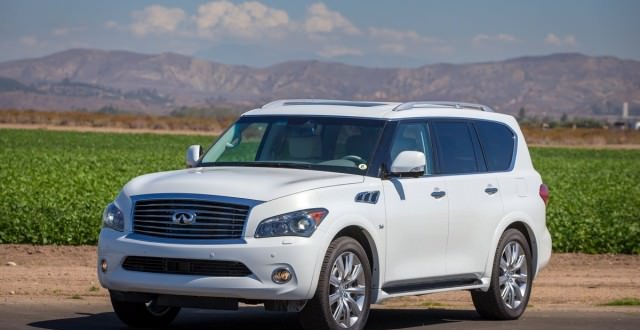Nissan North America is issuing a recall of some 2013 Infiniti QX56 and 2014 Infiniti QX80 sport-utility vehicles over concerns that the airbag could malfunction, potentially sending sharp metal fragments into occupants.
Nissan has no reports of injuries from the problem. It was discovered after General Motors recalled 33,000 Cruze compact cars for the same problem in June. The Infiniti recall is part of a larger global recall of 260,000 Nissans announced last week.
Takata says the recall only affects GM and Nissan vehicles and is separate from another one covering 8 million vehicles in the U.S. In that recall, prolonged exposure to high humidity can cause inflators to malfunction and explode with too much force. Safety advocates say four people have died due to that problem, which affects 10 different automakers.
Some automakers have limited their recalls to a small number of high-humidity areas, but lawmakers and others are demanding that recalls be expanded nationwide. Covered are cars made by Honda, Nissan, Chrysler, Ford, Mazda, Subaru, Mitsubishi, Toyota, BMW and General Motors.
The National Highway Traffic Safety Administration is investigating the humidity issue and could expand the size of the recall. Lawmakers say there are about 30 million vehicles on the road in the U.S. with potentially defective Takata air bags.
Nissan said in documents posted Friday by NHTSA that it asked Takata about the baffle problem after General Motors recalled 33,000 Chevrolet Cruze compacts in North America last June. GM said in documents that it also went to Takata after it was sued by someone who was injured by an exploding air bag.
On Thursday, U.S. safety regulators ordered Takata to provide more information about potentially faulty air bags. The order made 36 separate requests for data on production mistakes, lawsuit settlements and reports of deaths or injuries that the Tokyo-based company has received. NHTSA also wants to know how many replacement parts Takata can make each day and what it has discussed with automakers and competitors.
Takata has until Dec. 1 to turn in the information or it could face fines of $7,000 per day. A Takata spokesman said the company is cooperating and will work to meet the agency’s requests.
Takata, the world’s second-largest air bag maker with 22 percent of the market, has been plagued by problems with its air bags since at least 2001. That year, Japanese automaker Isuzu reported an exploding air bag in the Isuzu Rodeo and Honda Passport, and quietly recalled three affected vehicles, according to a class action lawsuit against Takata and automakers that was filed this week in Florida.
Takata has given various explanations for the issue, including humid conditions at its factory in Mexico; improper welds; trouble with stamping equipment; and an improper amount of generant, which produces the gas that makes air bags inflate.
Agencies/Canadajournal
 Canada Journal – News of the World Articles and videos to bring you the biggest Canadian news stories from across the country every day
Canada Journal – News of the World Articles and videos to bring you the biggest Canadian news stories from across the country every day



